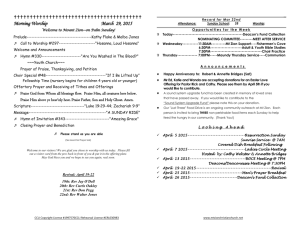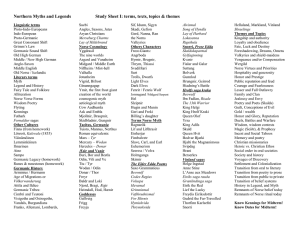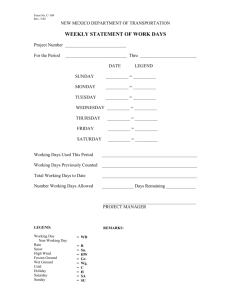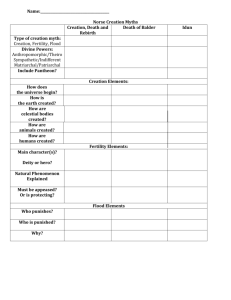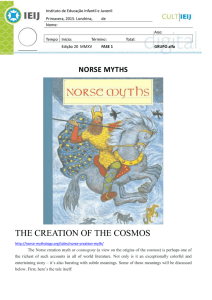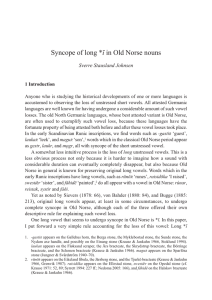Word Document
advertisement
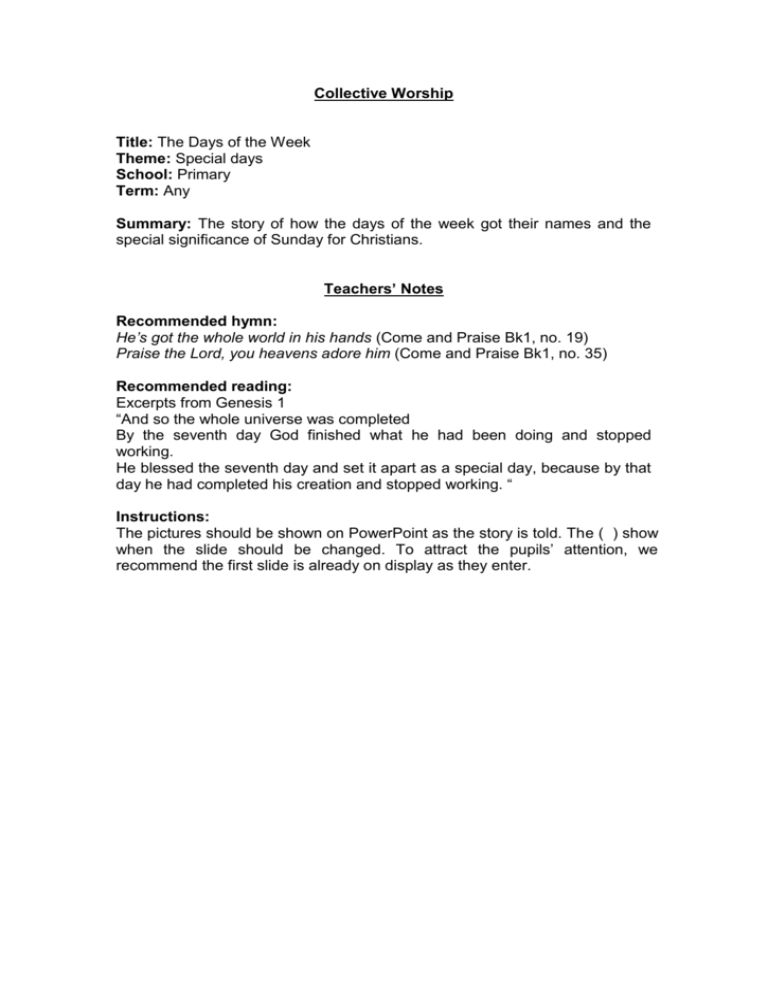
Collective Worship Title: The Days of the Week Theme: Special days School: Primary Term: Any Summary: The story of how the days of the week got their names and the special significance of Sunday for Christians. Teachers’ Notes Recommended hymn: He’s got the whole world in his hands (Come and Praise Bk1, no. 19) Praise the Lord, you heavens adore him (Come and Praise Bk1, no. 35) Recommended reading: Excerpts from Genesis 1 “And so the whole universe was completed By the seventh day God finished what he had been doing and stopped working. He blessed the seventh day and set it apart as a special day, because by that day he had completed his creation and stopped working. “ Instructions: The pictures should be shown on PowerPoint as the story is told. The ( ) show when the slide should be changed. To attract the pupils’ attention, we recommend the first slide is already on display as they enter. The Main Text (Picture 1) How many days are there in a week? What day is it today? Do you have a favourite day of the week? Perhaps you prefer a particular school day because you like the lessons that you have on that day. Or perhaps you like the weekends best when you can spend time with your family and friends. Have you ever wondered how the days of the week got their names? Today we will find out a little about what these names mean. (Picture 2) It was the ancient Egyptians that first invented a calendar similar to the year we know today. It had 365 days and was based on the cycle of the Moon going around the Sun. (Picture 3) After this the Babylonians, who lived in a city in the country we know today as Iraq, divided the year up into 52 weeks of seven days each. The Romans liked this idea. They introduced it in the first century AD and gradually it became used throughout the world. (Picture 4) The first day of the school week is Monday. This is a day that some people don’t like because they have to start work again after the weekend! In your great-grandparents’ time it was the day when housewives did all their washing. Monday comes from the old English word ‘monandaeg’ meaning ‘moon’s day’. (Picture 5) The days from Tuesday to Friday are named after characters in stories from Norse mythology. The Norse people lived in the area of Europe we know today as Scandinavia, which includes Denmark, Norway, Sweden and Finland. (Picture 6) Tuesday (or Tiw’s day) is named after Tiw, who was the Norse god of war. He is often pictured as a one-handed god, after he lost it in a fight with a fierce wolf. (Picture 7) Wednesday (or Woden’s day) is named in honour of Woden, who was the king of the gods. He is often pictured with his two black ravens called Thought and Memory. They were believed to fly all over the world to bring back news of what was happening. (Picture 8) Thursday (or Thunor’s day) is named after Thunor, the Norse god of storms and thunder. He had a magic hammer. When he threw it into the distance, it always returned to him. The sound of thunder is said to be the sound of Thor’s chariot rolling across the heavens. (Picture 9) Friday is named after Fria, the beautiful Norse goddess of love and battle. She is often pictured holding weapons such as a sword and a spear. (Picture 10) Saturday is named after the Roman god Saturn. As well as being the name of a planet, Saturn was the god of farming. He carried a sickle for harvesting the crops. In the Jewish faith, Saturday is known as the Sabbath day and it is their special day for rest and worship. (Picture 11) Our last day today is Sunday - although it’s really the first day of the week. It comes from an old English word meaning ‘Sun’s day’. It is thought to be the day dedicated to the sun god Helius, who was the god of music, poetry healing and sport. Sunday is the day that Christians put aside for worship and rest. This is because Sunday is the day that we remember that Jesus rose from the dead after being crucified on Good Friday (Picture 12) You may have heard this popular nursery rhyme: Monday’s child is fair of face. Tuesday's child is full of grace. Wednesday's child is full of woe. Thursday's child has far to go. Friday's child is loving and giving. Saturday's child works hard for a living, But the child who is born on the Sabbath day Is happy and wise in every way. Of course the poem isn’t true! We don’t believe that the day on which you were born on determines what sort of person you will be, or what will happen to you. Let us end with a prayer thanking God for each new day that he gives us: Prayer Dear Lord Thank you for each new morning. Thank you especially for the day of Sunday when we can take time to remember all the gifts that you give us. Thank you for keeping us happy and healthy. Thank you for the gift of family and friends. Help us to live our lives in a thoughtful and helpful way, every day of the week. In Jesus’ name, Amen



